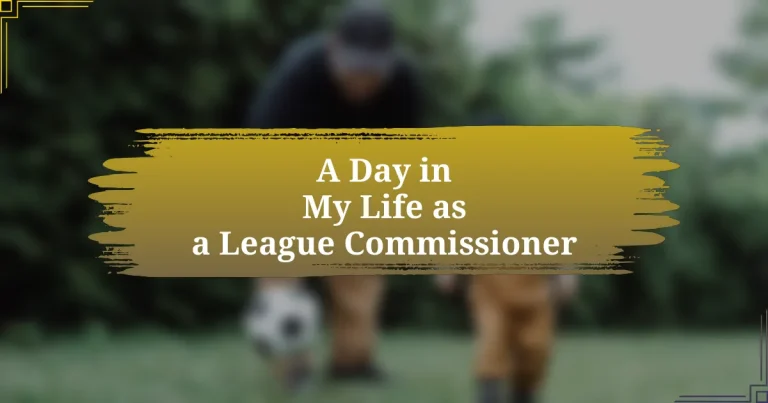Key takeaways:
- The role of a League Commissioner involves fostering community, resolving conflicts, and enhancing the overall experience for league members.
- Fantasy football is a vehicle for building friendships, increasing engagement with the NFL, and providing healthy competition.
- Effective communication is essential for managing team conflicts and ensuring league members feel heard and valued.
- Celebrating achievements and incorporating member feedback contribute to a more enjoyable and connected league experience.
Author: Emma Hartley
Bio: Emma Hartley is an accomplished author known for her compelling narratives that explore the complexities of human relationships and societal themes. With a background in psychology and literature, her work often fuses emotional depth with sharp wit, captivating readers around the world. Emma’s novels have earned critical acclaim and numerous awards, solidifying her place in contemporary fiction. When she’s not writing, she enjoys hiking and volunteering with local literacy programs. Emma resides in Seattle with her two rescue dogs, and she is currently working on her next novel.
Understanding League Commissioner Role
The role of a League Commissioner is often more challenging than many realize. When I first stepped into this position, I was overwhelmed with how many responsibilities came with it. It’s not just about managing rosters or keeping score; it’s about fostering community and ensuring that everyone enjoys the game.
One of my favorite memories as a commissioner was organizing our draft night. I remember the buzz of excitement in the air as everyone gathered, snacks in hand, ready to compete. But have you ever faced conflicts among team owners? Navigating those disputes is part of the gig, and it demands a delicate balance of authority and empathy.
Ultimately, I see the commissioner as a steward of the league’s culture. Creating an environment where everyone feels included and invested is vital. I often ask myself, “How can I elevate the experience for each manager?” It’s this ongoing reflection that drives me to improve and evolve the league each season.
Importance of Fantasy Football
Fantasy football holds significant importance beyond just the thrill of competition; it brings people together in unique ways. I remember the first time I joined a league; the camaraderie we built was something I hadn’t anticipated. Each week, we would exchange playful banter online and cheer for our players, forging friendships that extended beyond the game.
What’s fascinating to me is how fantasy football enhances our understanding of the actual NFL. As I dove deeper into player statistics and matchups, I found myself more engaged with the games on Sundays. It’s a cycle of excitement—rooting for my fantasy players while also supporting my favorite NFL team. Doesn’t it feel rewarding to see your knowledge translate into success on both fronts?
In addition to fostering friendships and a deeper appreciation for the sport, fantasy football provides an avenue for healthy competition. I’ve witnessed rivalries develop, leading to memorable moments like last-minute touchdowns that determined the week’s victor. Each season, players bring their strategies and insights, which can lead to unforgettable stories. Isn’t it amazing how a game can transform our Sundays into thrilling drama?
Daily Responsibilities of a Commissioner
As a league commissioner, staying organized is a top priority. Every day, I check in on player rosters, monitor trades, and review any last-minute waiver claims. It’s fascinating how even a single injury can shake things up, reminding me that adaptability is key.
Communication is another crucial responsibility I embrace. I try to touch base with all league members regularly, whether it’s sending a quick reminder about upcoming draft deadlines or engaging in light-hearted chats about our beloved players. I’ve found that fostering that ongoing dialogue not only keeps everyone informed but also strengthens the bond our league shares. How often do you chat with your league mates outside of game day?
Another daily task involves managing league settings and rules. This past season, for instance, we debated the point system for defenses, and it became a lively discussion filled with various opinions. I remember feeling a mix of excitement and anxiety as everyone shared their thoughts. Ultimately, ensuring that all members feel heard makes the league more enjoyable, turning the game into a collaborative effort rather than a simple competition. Isn’t it satisfying when everyone works together to enhance their experience?
Preparing for Draft Day
Preparing for draft day is a blend of excitement and strategy. I always start by reviewing the latest player rankings and injury reports, preparing myself for any last-minute surprises. It’s like piecing together a puzzle; you want to ensure you have all the crucial pieces before the big day.
In the days leading up to the draft, I enjoy hosting mock drafts with other league members. These sessions not only sharpen my drafting skills but also provide an opportunity to gauge the strategies of my fellow competitors. There’s something exhilarating about the thrill of simulated pressure—don’t you find it adds a layer of anticipation to the actual event?
As the draft approaches, I create a draft board with my top picks highlighted. I remember one particular year when I had my eyes set on a breakout player, and everyone seemed to underestimate him until the end. Watching him slide down the rankings and finally snagging him was such a rush! Preparing this way is vital; it helps me stay focused amidst the buzz of excitement and makes sure I’m ready to seize those golden opportunities as they come.
Managing Team Conflicts Efficiently
Managing Team Conflicts Efficiently
In my experience, conflicts in fantasy football leagues often arise from miscommunication or differing expectations. I recall a heated dispute in one league over a trade that felt unfair to some participants. By facilitating open discussions, I helped everyone express their feelings, ultimately leading to a more respectful understanding among the managers. Isn’t it interesting how clear communication can turn potential disputes into opportunities for collaboration?
Resolving disagreements promptly is essential. I’ve found that waiting too long can escalate tensions unnecessarily. One time, a disagreement over starting lineups lingered for days, negatively affecting the league’s vibe. Since then, I’ve made it a practice to encourage league members to reach out to me with their concerns right away, ensuring that we can tackle issues before they fester.
Keeping the league fun is a top priority. I often remind everyone that we’re here to enjoy ourselves; competitions should be friendly, not fierce. By implementing a ‘cool-down’ period after any conflict—where all parties step back and reflect—everyone can come back to the table with a clearer head. It’s fascinating how a little time often leads to breakthroughs in understanding, don’t you think?
Engaging with League Members
Engaging with league members is about building relationships and fostering a community. I remember when we started using a dedicated chat group for our league. This platform became a hub for banter and trade discussions, and it transformed how we interacted. It’s incredibly rewarding to see members share insights and jokes, creating an atmosphere that truly feels like camaraderie. Have you noticed how shared experiences can deepen connections among members?
I also make it a point to celebrate achievements and milestones within the league. One year, I organized a virtual draft party that included games and trivia related to our players and teams. Not only did this event elevate excitement, but it also allowed us to bond over shared interests. It was heartwarming to see the smiles and hear the laughter as we discussed favorite players and past season highlights. I believe that these moments reinforce a sense of belonging within our league.
Feedback is a crucial part of engagement as well. I regularly send out surveys after the season to gather insights on what members enjoyed and what could be improved. One year, a suggestion emerged about introducing weekly themed challenges, which added a new layer of fun. Watching our league evolve based on members’ input not only validates their opinions but also strengthens everyone’s investment in the league. How do you create an environment where feedback is not just heard but valued?
Reflecting on a Successful Season
Reflecting on the season brings back so many memories that highlight our league’s growth. I remember the thrill of the final playoff match; the atmosphere was electric, and it felt like everyone was glued to their screens. Seeing the excitement in the chat as the scores changed was a testament to how invested we all became. Does it ever surprise you how much a simple game can bring people together?
Another moment that stands out was when I hosted our end-of-season awards ceremony. It wasn’t just about acknowledging the top players; we also celebrated those who brought humor and heart to our league. As I announced the “Best Trade” award, laughter filled the virtual room, and it felt like a true celebration of our shared journey. It’s fascinating how these small gestures create lasting bonds, don’t you think?
Looking back, I can see how each decision I made, from scheduling events to encouraging communication, shaped our league’s identity. One of my proudest achievements was noticing how our community became more supportive over time. I often ask myself: what makes a season memorable? For me, it’s the friendships formed and the shared experiences that make it all worthwhile.














